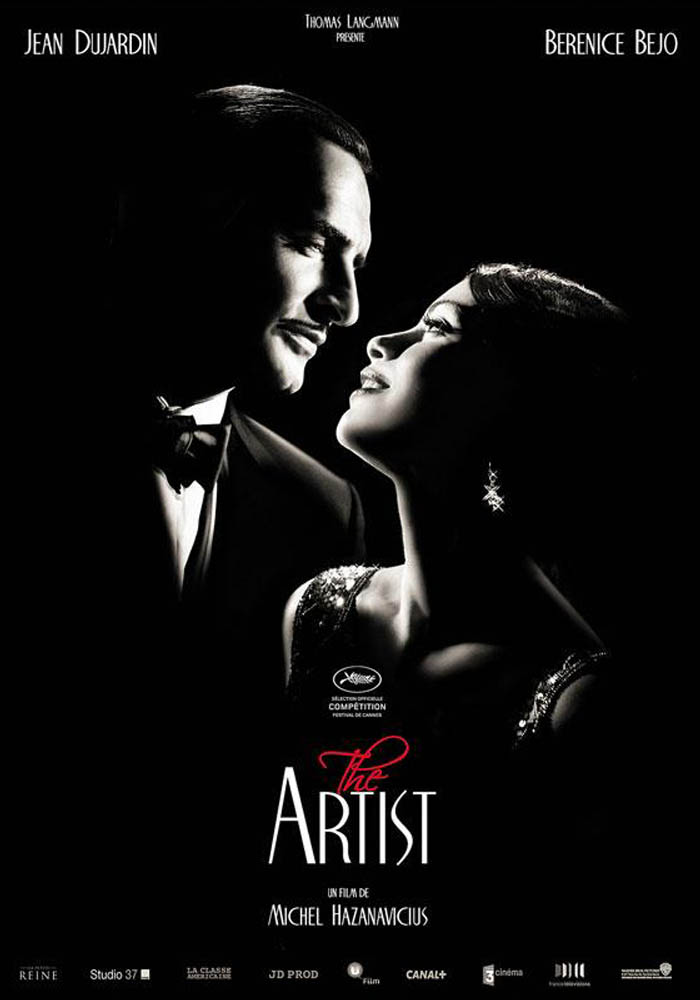*****
When asked if she would like to see The Artist, my Grandmother said, "Why would anyone make a black and white, silent movie in this day and age?" She did not go see it. It is a fair question, but one could also ask why anyone would make a hand-drawn animated movie today. Or a 70's style blaxploitation or kung-fu movie. Or a 40's style film noir. The answer is two part: homage, and service to the story. The Artist is undoubtedly an homage to the end of the first great era in movie making: the silent era. It is a cousin to Hugo (which celebrated the birth of film itself) and Super 8 (which celebrated the birth of the blockbuster and the juvenile film making that gave rise to some of today's most prolific directors), rounding out a coincidental trilogy of love letters to the movies in 2011. But it also serves its story, of a silent film star doomed by the advent of "talkies," brilliantly. And it manages to emerge as one of the most giddily entertaining movies I've seen in a good, long time. Charming in its simplicity, often hilarious, this one kept a grin on my face for the vast majority of its run time. The grin faded a bit in the last act, as the movie takes a melodramatic turn (not because I was unhappy with how it was going, but because it does the melodrama as well as everything else) that culminates in one of the most shocking-but-clever uses of a title card I've ever seen in a movie of this type. The movie should not be judged by being black and white and silent; you should watch it even if you think you don't like this type of movie. You'll probably be surprised.
And it's not really a silent movie anyway. Director Michel Hazanavicius cleverly uses sound at a few key points in the movie. An inspired dream sequence shows silent star (and titular Artist) George Valentin (Jean Dujardin) discovering everything around him, including his dog and perpetual costar Uggie, suddenly making sounds while he himself remains unable to speak. This sequence manages to be both horrific (in its implications for Valentin) and hilarious (in the way it plays with our expectations of "silent movies"). And watch for the falling feather (not that you could miss it); it's slow decent is both the dramatic and comic climax of the scene. Hazanavicius, in his directing and script, continues to play with what we know and expect about silent films, even as he displays his enormous respect for them. In another moment that manages to be both devastating and hilarious (a difficult blend pulled off over and over again here) rising starlet Peppy Miller (Berenice Bejo) is being interviewed in a restaurant, and says (in a title card, of course) that people are tired of silent stars mugging at the camera, referencing the theatrical over-acting usually employed in silent films. Valentin happens to be sitting behind her when she says this, and expresses his displeasure by mugging at the camera!
Speaking of that over-the-top acting style, Dujardin and Bejo do it perfectly in the leads, but that's not all they do. Their faces are so open and expressive they could have actually been silent film stars (that they both have fairly substantial accents would have mattered about as much then as it does here, now), but it's when the movie requires a bit more subtlety and nuance that the performances shift from being just very good and comical to being purely brilliant. Dujardin especially is a wonder, creating a character who's proud without being Clooneyesque (smug), who hides enormous fear and (with the fall that always cometh after pride) pain with a 1,000 watt movie star smile. It sits alongside the immortal Brigitte Helm in Metropolis as one of the best silent performances I've seen, and I really hope he wins the Oscar. The rest of the supporting cast is wonderful, most notably John Goodman as imperious director Al Zimmer, James Cromwell as the faithful chauffeur Clifton, and Missi Pyle (whose hugely expressive face I now realise was made for silent movies) as jilted starlet Constance. Oh yes, and I'm obligated by the great movie gods to again mention Uggie the dog, who does indeed steal more than a few scenes.
So yes the movie is black and white and it is mostly silent. It is also brilliantly written and directed, beautifully shot (in that wonderful old silent movie aspect ratio of 1.33 to 1), perfectly acted, uproariously funny, more than a little moving, and incredibly entertaining. In the end, isn't that all we go to the movies for?
Post Script: This is the most ludicrous PG-13 rating I've ever seen. The MPAA cites "A crude gesture and a disturbing image" as the reason for the rating. The gesture would be a simple bird flipped right at the beginning. I won't mention the image, but while I agree it's disturbing, it's certainly no more so than a number of scenes in The Lion King, for example, which was rated G. Ignore the rating; this one's appropriate for everybody!

No comments:
Post a Comment